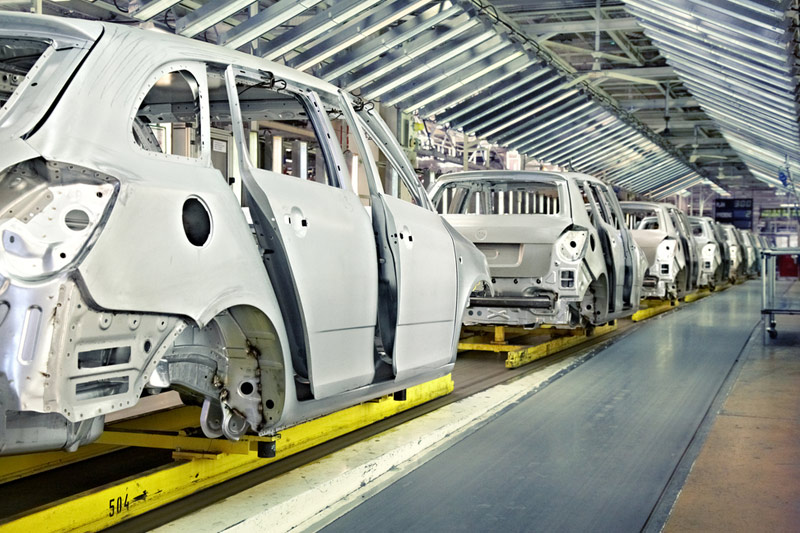By David Lawder
WASHINGTON, Aug 14 (Reuters) - The Trump administration has set a collision course with the auto industry as it launches renegotiation of the 23-year-old NAFTA trade pact this week, aiming to shrink a growing trade deficit with Mexico and tighten the rules of origin for cars and parts.
More than any other industry, autos have been the focus of U.S. President Donald Trump's anger over the North American Free Trade Agreement, which he blames for taking car factories and jobs away from the United States to low-wage Mexico.
The U.S. trade deficit with Mexico in autos and auto parts reached $74 billion last year, the dominant component of an overall $64 billion U.S. deficit, according to Census Bureau data.
"The Trump administration has framed their NAFTA negotiating objectives around reducing the trade deficit with Mexico," said Caroline Freund, a senior trade fellow at the Peterson Institute for International Economics. "If they don't touch autos, there's no way of getting at what they want."
Among tools that U.S. Trade Representative Robert Lighthizer may seek to boost U.S. auto employment is strengthening the rules of origin to shut out more parts from Asia, and possibly an unprecedented U.S.-specific content requirement for Mexican vehicles.
Lighthizer's negotiating objectives for NAFTA seek to "ensure the rules of origin incentivize the sourcing of goods and materials from the United States and North America," which has raised concerns among auto industry executives and trade groups that he will seek a deal that guarantees a certain percentage of production for the United States.
The industry is opposed to such a carve-out or to increasing the percentage of a vehicle's value that must come from the region above the current 62.5 percent - already the highest of any global trade bloc.
It says this would raise costs and disrupt a complex supply chain in which parts crisscross NAFTA borders, making North American car production competitive with Asia and Europe.
"Our members feel very strongly that rules of origin are not the tools to use to reshore jobs into the U.S.," said Ann Wilson, senior vice president of government affairs for the Motor and Equipment Manufacturers Association, a trade group representing auto parts makers.
Wilson and other industry advocates say a better way to boost U.S. manufacturing jobs is through policies aimed at expanding vehicle exports.
The issue is also sensitive in Canada, another major NAFTA auto producing center. Foreign Minister Chrystia Freeland on Monday said she was prepared to discuss "some strengthening of the rules of origin" but made no commitments.
"We are also extremely mindful of the possibility that any changes... could have unintended consequences," she told reporters in Ottawa. THRESHOLD
If U.S. Commerce Secretary Wilbur Ross gets his way, it would be harder to reach the 62.5 percent content threshold because the "tracing list" of parts that count toward that goal would be modernized. He argues that current rules are too loose and allow a tariff-free "back door" for Chinese auto parts.
Parts that did not exist when the 300-plus-page list was devised in the early 1990s - largely electronics sourced from Asia such as console touch screens or hybrid-drive controllers - do not count against reaching the threshold. If they are put on the list, companies would have to source them from North America or pay tariffs.
If the content requirements become too onerous, automakers will simply skip compliance "and they'll just end up paying the duty," said Charles Uthus, vice president for international policy at the American Automotive Policy Council, a lobbying group for Ford Motor (NYSE:F) Co. F.N , General Motors (NYSE:GM) GM.N and Fiat Chrysler FCHA.MI .
Foregoing all NAFTA tariff-free access benefits - which could happen if Trump is dissatisfied with the negotiations and decides to scrap the trade pact - would raise costs by about $4 billion-$5 billion a year, Ulthus added. Ford plans about $7 billion in total capital spending this year.
DISPUTE MECHANISM DISPUTED
Among the other contentious NAFTA issues that U.S., Canadian and Mexican negotiators will tackle starting on Wednesday in Washington is the future of a mechanism for resolving trade disputes.
The United States wants to eliminate a so-called "Chapter 19" provision, arguing that it fails to combat unfair subsidies of some Mexican and Canadian goods. Mexico and Canada have vowed to keep the provision.
U.S. negotiators will also seek a provision to deter currency manipulation, aiming to set a precedent for future trade negotiations, such as a revised U.S.-North Korean deal or a bilateral pact with Japan.
The negotiations face a tight timeline, with officials saying they want to finish by early next year to avoid ratification difficulties posed by elections in Mexico in July 2018 and in the United States in November 2018.
Freund said the negotiators should focus on a few key areas, given that a comprehensive update of NAFTA would take a lot more than six months.
"Ultimately I think they're going to get bogged down in all these details and pick two to three things and have a smaller agenda," she said. (Additional Reporting by Lesley Wroughton; Editing by Chris Reese and Dan Grebler)
